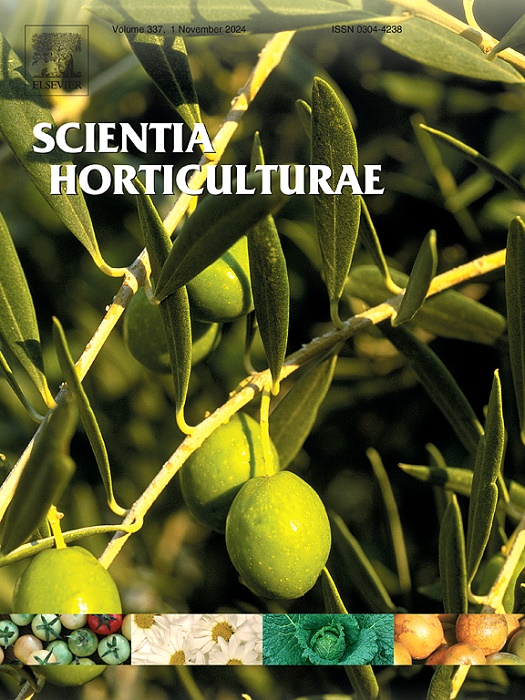Comparative transcriptome analysis between ‘Meiguicheng’ (Citrus sinensis) and its seedless mutant during early sexual organs development
IF 3.9
2区 农林科学
Q1 HORTICULTURE
引用次数: 0
Abstract
Female sterility is one of the keys determining seedlessness formation in citrus. However, the molecular basis for female sterility in citrus is still far from fully understood. In the present study, differentially expressed genes were identified in sexual organs of ‘Meiguicheng’ orange (Citrus sinensis) and its seedless mutant, candidate genes were then verified by RT-PCR, live-cell imaging technique and physiological biochemistry. Using high-throughput sequencing, 96 and 710 differentially expressed genes (DEGs) were captured in the ovaries and anthers, respectively, during megasporogenesis and microsporogenesis (Ph1). The number of DEGs in ovaries and anthers increased to 325 and 1760, respectively, post gametophyte abortion (Ph2). GO analysis and non-structural carbohydrates determination displayed that disturbances to starch and sucrose metabolism in anthers were responsible for male sterility. In Ph1 ovaries, five DEGs were enriched in reproduction process, one of which (Cs7g06410) was also involved in signaling. Whereas in Ph2 ovaries, eight DEGs were enriched in reproductive process, accompanied with four other DEGs involved in plant hormone signal transduction. PlantTFDB prediction indicated that, in the ovary, four transcription factors (TFs) at Ph1 were differentially expressed. Our findings displayed that Cs2g16620 (PIN1), Cs7g06410 (NPH3), and Cs3g23070 (MYB) might play pivotal roles in citrus female sterility through manipulating auxin transport and accumulation within the ovules, providing potential genes for further investigations on female gametophyte development and transgenic breeding in citrus.
柑橘 "美桂城 "及其无籽突变体在早期性器官发育过程中的转录组比较分析
雌性不育是决定柑橘无籽形成的关键之一。然而,柑橘雌性不育的分子基础还远未完全清楚。本研究鉴定了 "美桔 "及其无籽突变体有性器官中的差异表达基因,并通过 RT-PCR、活细胞成像技术和生理生化方法验证了候选基因。利用高通量测序技术,在巨孢子发生和小孢子发生(Ph1)过程中,分别在子房和花药中捕获了96个和710个差异表达基因(DEGs)。配子体流产后(Ph2),子房和花药中的 DEGs 数量分别增至 325 个和 1760 个。GO 分析和非结构碳水化合物测定显示,花药中淀粉和蔗糖代谢紊乱是导致雄性不育的原因。在 Ph1 子房中,有五个 DEGs 富集于生殖过程,其中一个(Cs7g06410)还参与了信号转导。而在 Ph2 子房中,有 8 个 DEGs 在生殖过程中富集,同时还有 4 个 DEGs 参与植物激素信号转导。PlantTFDB 预测表明,在子房中,Ph1 的四个转录因子(TFs)有差异表达。我们的研究结果表明,Cs2g16620(PIN1)、Cs7g06410(NPH3)和Cs3g23070(MYB)可能通过操纵胚珠内的辅助素运输和积累在柑橘雌性不育中发挥关键作用,为进一步研究柑橘雌配子体发育和转基因育种提供了潜在基因。
本文章由计算机程序翻译,如有差异,请以英文原文为准。
求助全文
约1分钟内获得全文
求助全文
来源期刊

Scientia Horticulturae
农林科学-园艺
CiteScore
8.60
自引率
4.70%
发文量
796
审稿时长
47 days
期刊介绍:
Scientia Horticulturae is an international journal publishing research related to horticultural crops. Articles in the journal deal with open or protected production of vegetables, fruits, edible fungi and ornamentals under temperate, subtropical and tropical conditions. Papers in related areas (biochemistry, micropropagation, soil science, plant breeding, plant physiology, phytopathology, etc.) are considered, if they contain information of direct significance to horticulture. Papers on the technical aspects of horticulture (engineering, crop processing, storage, transport etc.) are accepted for publication only if they relate directly to the living product. In the case of plantation crops, those yielding a product that may be used fresh (e.g. tropical vegetables, citrus, bananas, and other fruits) will be considered, while those papers describing the processing of the product (e.g. rubber, tobacco, and quinine) will not. The scope of the journal includes all horticultural crops but does not include speciality crops such as, medicinal crops or forestry crops, such as bamboo. Basic molecular studies without any direct application in horticulture will not be considered for this journal.
 求助内容:
求助内容: 应助结果提醒方式:
应助结果提醒方式:


